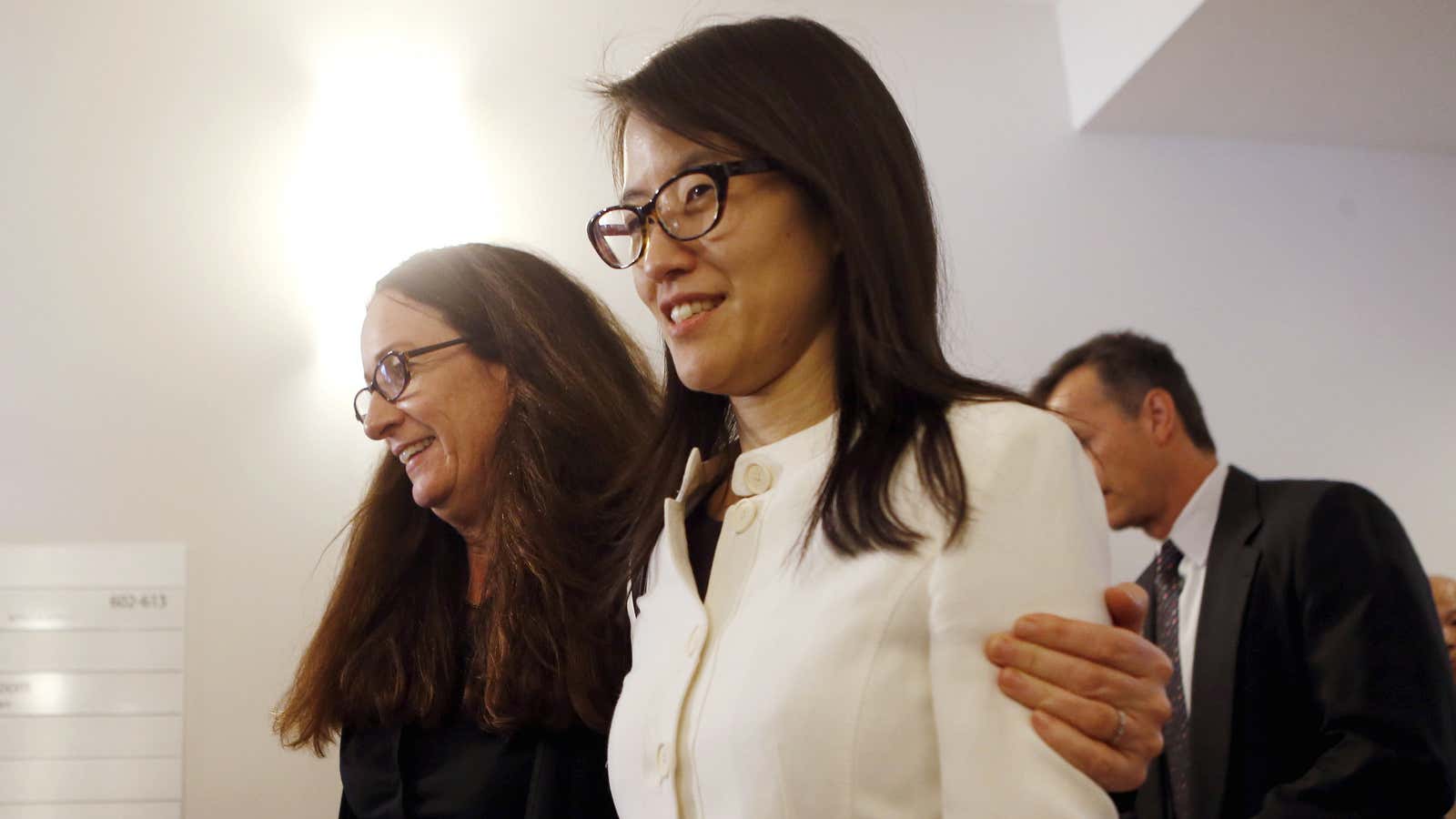On Mar. 27, Ellen Pao lost her gender discrimination trial against her former employer, high-profile venture capital firm Kleiner Perkins Caufield & Byers. While the court may have ruled against her, it’s important not to lose sight of how important this case is in a broader context.
Despite its outsized impact on the US economy, the world of venture capitalists remains largely removed from scrutiny and accountability. Working women are sure to have recognized many of the episodes described in Pao’s case from personal experiences and experiences of their friends.
Yet despite the depressing familiarity, there are still few mechanisms to push for fairer treatment beyond a lawsuit.
Pao sued Kleiner Perkins, in part, to advance women in the clubby world of venture capital. “If I’ve helped to level the playing field for women and minorities in venture capital, then the battle was worth it,” she said. One could argue she sacrificed her right to privacy, allowed her life to be examined and picked over in open court in order to reveal how sexism operates in the plutocratic venture capital world and, by extension, Silicon Valley.
The details of the alleged discrimination have been abundantly analyzed elsewhere, but some of the highlights include men-only ski trips and dinners, segregated so women wouldn’t “kill the buzz.” While a jury of her peers may have disagreed, these types of adolescent attitudes are a clear reflection of an industry that itself is in adolescence. Mix in what Pao argued was a lack of basic human-resource functions, and you have the perfect environment for discrimination.
The good news is, Ellen Pao’s sacrifice may not ultimately have been made in vain. Newly filed gender discrimination lawsuits against Facebook and Twitter suggest her lawsuit may serve as a catalyst for women who realize their gender is holding them back.
Interestingly, American corporations might be wise to learn from their foreign competitions. Outside the US, some countries are taking a much more aggressive stance to advance women, indicating an increased awareness of the important role female leadership has to play in greater economic growth and lower economic volatility. On Mar. 6, Germany passed legislation requiring its largest companies to fill at least 30 percent of board seats with women by next year. This quota will rise to 50 percent in 2018.
Germany follows in the footsteps of several smaller European economies in setting gender quotas for board members, beginning with Norway in 2008. Currently, Norwegian companies have 35.5 percent women on their boards, essentially double the level in the US.
But don’t get excited just yet. Americans are unlikely to see European style quotas in the US any time soon due to the persistent belief that quotas are unfair and anti-meritocratic. This viewpoint has been largely upheld by testimony in the Ellen Pao case, which ultimately determined even a lousy, highly subjective environment isn’t necessarily illegal.
Perhaps more than anything, Ellen Pao’s efforts have proved that good intentions aren’t enough. According to testimony from Paul Gompers, a professor at Harvard Business School, Kleiner Perkins employed substantially more women as investors than the vast majority of venture capital firms in the US. Ironically, at least by the numbers, Kleiner Perkins far outpaces its competition.
Companies that hope to benefit from America’s great diversity of talent need to learn how to create an inclusive and fair culture, or risk alienating and even hindering the performance of top employees. Indeed, this trial arguably provides a useful case study for how Silicon Valley—and the rest of the corporate world generally—can do a better job, becoming more aware of unconscious bias in performance reviews and ending the exclusion of women from relationship building events.
Given the limited avenues in the US for advancing women at the highest levels of business, women really owe Ellen Pao a huge gratitude for taking such a public stance. If we want to make more progress in the US—beyond the pressure that large shareholders can exert, that is—we will need to take seriously the lessons we have learned from the Ellen Pao case.




